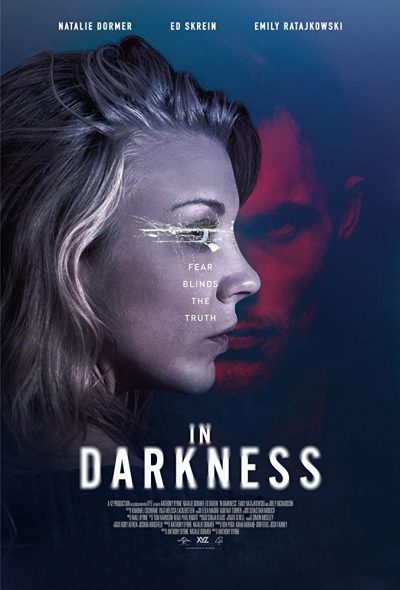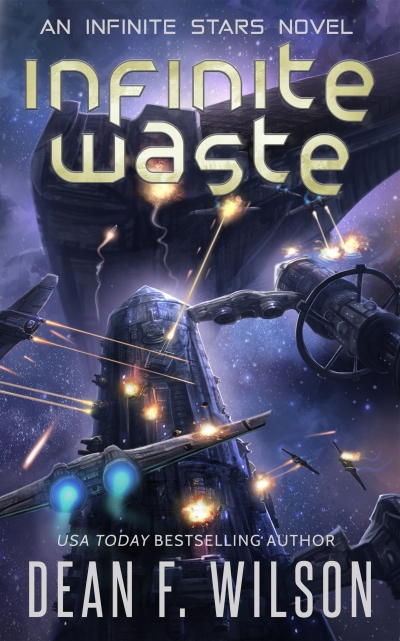★★★½
“Lies, damned lies and motherhood.”
 After an extinction-event has turned Earth uninhabitable, an underground “ark” holds thousands of human embryos, overseen by a robotic Mother (voiced by Byrne, performed by Hawker). One embryo is brought to fruition, becoming Daughter (Rugaard, resembling a young Jennifer Garner), who grows up into a young woman, educated by Mother to believe she’s alone on the planet. But she begins to doubt what Mother tells her, and these doubts are confirmed when another, older woman (Swank) shows up. Let in by Daughter, she tells tales of humanity outside struggling for survival against robot killers. Everything Daughter has been told is a lie. Or is the new arrival telling the whole truth either?
After an extinction-event has turned Earth uninhabitable, an underground “ark” holds thousands of human embryos, overseen by a robotic Mother (voiced by Byrne, performed by Hawker). One embryo is brought to fruition, becoming Daughter (Rugaard, resembling a young Jennifer Garner), who grows up into a young woman, educated by Mother to believe she’s alone on the planet. But she begins to doubt what Mother tells her, and these doubts are confirmed when another, older woman (Swank) shows up. Let in by Daughter, she tells tales of humanity outside struggling for survival against robot killers. Everything Daughter has been told is a lie. Or is the new arrival telling the whole truth either?
The film’s main strength is the way it manages expertly the shifting sands of audience perception. Initially, we’re led to believe that Mother is potentially the saviour of humanity. However, it soon becomes clear that the robot is not being entirely honest with her charge, and our sympathies move towards the Woman, who wants to rescue Daughter from her enforced isolation. Yet, in the end, there’s another agenda there as well, and right until the credits roll, you’re kept watching to see beyond the next bend in the story-line. While there are clues dropped, almost from the beginning, you may not notice them until everything comes together. Or perhaps even past that point; I’ll confess, I did have to do some light post-viewing Googling in order to grasp all the consequences.
It’s rare, especially in the SF genre, to see a film without a male speaking part [bar some archive footage from The Tonight Show, anyway!]. Though one senses any money saved on the small cast was simply diverted to an impressive set of production values, depicting not just the facility, but also the devastated outside world after… well, whatever the extinction event was, since it’s never described. That’s not really the focus of the film, yet I felt it was a bit of a shame, The story of the Woman’s survival, up until she came banging on the door, would have been equally interesting as the Daughter’s. I do have… let’s just say, some questions about the coincidence of them arriving at the air-lock at the same time, and also the Woman’s plot-convenient amnesia.
At 113 minutes, it does run somewhat long, and is a little light on action for my tastes. The film is definitely on the more cerebral side of science fiction cinema, something not apparent from the trailer. Rather than explosions, the script prefers to pose awkward questions about the needs of the many outweighing the needs of the few, or the moral implications of ripping it all up to start again. However, it never sinks to boring, with decent performances which help guide the film through the occasional doldrums. Hat-tip to Rob for steering me in the direction of a film which I’d otherwise likely have skipped past, in the never-ending and ongoing stream of Netflix original movies.
Dir: Grant Sputore
Star: Clara Rugaard, Rose Byrne, Hilary Swank, Luke Hawker





 The above quote does suggest that the makers here appreciate how ridiculous the entire thing is. And that self-awareness may be the main thing which saves this from being largely cringeworthy. Just because you
The above quote does suggest that the makers here appreciate how ridiculous the entire thing is. And that self-awareness may be the main thing which saves this from being largely cringeworthy. Just because you  Alexis Carew is a third-generation settler on the planet Dalthus, and the ward of her grandfather, her parents having been killed in an accident. But her future is murky, for Dalthusian law prohibits women from inheriting property, such as her family’s estates. With the alternative being a marriage Alexis really doesn’t want, the 15-year-old girl instead signs up to become a midshipman in Her Majesty’s Navy (or, at least, the space version thereof), on the interstellar sloop Merlin. However, this is largely just exchanging one set of problems for another, whether winning the respect of her colleagues, fending off the
Alexis Carew is a third-generation settler on the planet Dalthus, and the ward of her grandfather, her parents having been killed in an accident. But her future is murky, for Dalthusian law prohibits women from inheriting property, such as her family’s estates. With the alternative being a marriage Alexis really doesn’t want, the 15-year-old girl instead signs up to become a midshipman in Her Majesty’s Navy (or, at least, the space version thereof), on the interstellar sloop Merlin. However, this is largely just exchanging one set of problems for another, whether winning the respect of her colleagues, fending off the  I literally had to check at the end of this, to see if M. Night Shyamalan had been involved. Because rarely since the likes of Signs – or, worse still, The Village – has a final twist so completely derailed a movie. As soon as it happened here, I was immediately listing off the scenes previously which now made absolutely no sense at all. While it’s hard to provide more information without massive spoilerage, it turned a film which was doing not badly, into one which is a poster-child for poorly-conceived ideas.
I literally had to check at the end of this, to see if M. Night Shyamalan had been involved. Because rarely since the likes of Signs – or, worse still, The Village – has a final twist so completely derailed a movie. As soon as it happened here, I was immediately listing off the scenes previously which now made absolutely no sense at all. While it’s hard to provide more information without massive spoilerage, it turned a film which was doing not badly, into one which is a poster-child for poorly-conceived ideas. We’ve previously written about Pearl Ling Chang’s mad
We’ve previously written about Pearl Ling Chang’s mad  I’m generally an easy-going guy with regard to plots in my action heroine films. Give me adequate amounts of ass-kicking and I’ll happily overlook most weaknesses in the storyline. I mention this, to stress I’m not a nitpicky kind of reviewer, who requires an Aristotlean level of logic from their movies. So when I say, there are major problems with the scripting here… There are MAJOR problems with the scripting here.
I’m generally an easy-going guy with regard to plots in my action heroine films. Give me adequate amounts of ass-kicking and I’ll happily overlook most weaknesses in the storyline. I mention this, to stress I’m not a nitpicky kind of reviewer, who requires an Aristotlean level of logic from their movies. So when I say, there are major problems with the scripting here… There are MAJOR problems with the scripting here. I spent most of the movie going back and forth as to whether or not this qualified for inclusion here. Was its lead, perhaps, just
I spent most of the movie going back and forth as to whether or not this qualified for inclusion here. Was its lead, perhaps, just  I am a loner. A destroyed woman. A woman destroyed by people… I have a choice – to kill myself or to kill others. I choose TO PAY BACK MY HATERS. It would be too easy to leave this world as an unknown suicide victim. Society is too indifferent, rightly so. My verdict is: I, Olga Hepnarová, the victim of your bestiality, sentence you to death.
I am a loner. A destroyed woman. A woman destroyed by people… I have a choice – to kill myself or to kill others. I choose TO PAY BACK MY HATERS. It would be too easy to leave this world as an unknown suicide victim. Society is too indifferent, rightly so. My verdict is: I, Olga Hepnarová, the victim of your bestiality, sentence you to death. This initially seemed like a borderline entry, which I kept reading purely for entertainment. It’s about an exploratory star-ship, the Gemini, out on the very edge of known space, which comes across a giant barge, packed with nuclear waste and populated by a race of rat-humanoids, the Raetuumak. The Gemini is an appropriate name for the craft, as it’s effectively two separate ships, each with their own captain and very different approaches. Maggie Antwa, commander of Gemini Right, is a cautious scientist who abhors violence in any form, and was compelled to take on this mission after being involved in a environmentalist rebellion against the ruling Empire. Over in Gemini Left, on the other hand, Skip Sutridge is a square-jawed believer in shooting first and asking questions… well, never, to be honest. He has been sent to the fringes, probably to try and keep him out of trouble.
This initially seemed like a borderline entry, which I kept reading purely for entertainment. It’s about an exploratory star-ship, the Gemini, out on the very edge of known space, which comes across a giant barge, packed with nuclear waste and populated by a race of rat-humanoids, the Raetuumak. The Gemini is an appropriate name for the craft, as it’s effectively two separate ships, each with their own captain and very different approaches. Maggie Antwa, commander of Gemini Right, is a cautious scientist who abhors violence in any form, and was compelled to take on this mission after being involved in a environmentalist rebellion against the ruling Empire. Over in Gemini Left, on the other hand, Skip Sutridge is a square-jawed believer in shooting first and asking questions… well, never, to be honest. He has been sent to the fringes, probably to try and keep him out of trouble. As the world goes through the zombie apocalypse, Molly (Allen) and boyfriend Nick (Mondesir) are elsewhere. Specifically, driving through the desert near Las Vegas, heading towards an airfield where they are going to catch a flight to Mexico – and, hopefully, safely. After their car gets stuck in the sand, Nick is attacked by a lone zombie (Riedinger), Molly flees on foot, striking out in the hopes of getting to the airfield, and pursued by the relentless creature. For it turns out the heroine is having her period, which allows the zombie to track her – and also lends a rather different meaning to the film’s title…
As the world goes through the zombie apocalypse, Molly (Allen) and boyfriend Nick (Mondesir) are elsewhere. Specifically, driving through the desert near Las Vegas, heading towards an airfield where they are going to catch a flight to Mexico – and, hopefully, safely. After their car gets stuck in the sand, Nick is attacked by a lone zombie (Riedinger), Molly flees on foot, striking out in the hopes of getting to the airfield, and pursued by the relentless creature. For it turns out the heroine is having her period, which allows the zombie to track her – and also lends a rather different meaning to the film’s title…